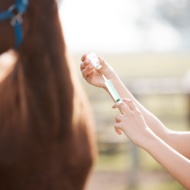They may also listen better to female speakers.
A study has revealed that dogs respond better to ‘baby-talk’ or ‘dog-talk’ than normal adult speech.
The research aimed to discover if dogs’ brains, being of limited linguistic competence, were sensitive to different speech styles, much in the way that infants are.
Infant-directed speech, often characterised by exaggerated prosody, is considered important to a child’s cognitive, social and language development.
The study investigated if dogs had similar responses to infant-directed or dog-directed speech.
To examine this, researchers used a functional magnetic resonance imaging (fMRI) machine to measure the brain activity of trained, conscious family dogs listening to different styles of speech.
The dogs heard dog-, infant- and adult-directed speech that had been recorded from 12 women and 12 men in real-life interactions.
The results showed that the dogs’ auditory brain regions responded more to dog-directed and infant-directed speech than to adult-directed speech.
This is the first neural evidence that dogs are tuned to speech that is directed specifically to them.
Furthermore, the data also showed that the dogs’ speech sensitivity was more pronounced when listening to dog-directed or infant-directed speech that was spoken by women, being affected by voice pitch and variation.
This neurone sensitivity to pitch and tone may explain why domesticated dogs outperform other animals when processing speech.
The investigation was conducted by researchers at Eötvös Loránd University’s Department of Ethology, the Research Centre for Natural Sciences and the Eötvös Loránd Research Network.
Anna Gergely, co-first author of the study, said: “Studying how dog brains process dog-directed speech is exciting, because it can help us understand how exaggerated prosody contributes to efficient speech processing in a non-human species skilled at relying on different speech cues (e.g. follow verbal commands).”
Anna Gábor, co-first author of the study, said: “What makes this result particularly interesting is that in dogs, as opposed to infants, this sensitivity cannot be explained by either ancient responsiveness to conspecific signals or by intrauterine exposure to women's voice[s].
“Remarkably, the voice tone patterns characterising women’s dog-directed speech are not typically used in dog-dog communication – our results may thus serve evidence for a neural preference that dogs developed during their domestication.”
The full study can be found in the journal Communications Biology.
Image (C) Shutterstock



 Zoetis UK has apologised for a supply shortage of Equip Artervac, caused by a manufacturing issue.
Zoetis UK has apologised for a supply shortage of Equip Artervac, caused by a manufacturing issue.